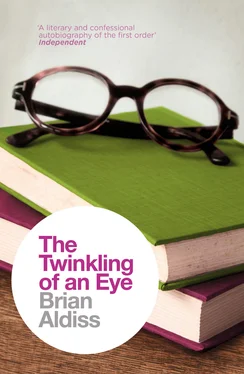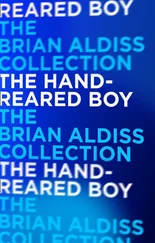1 ...6 7 8 10 11 12 ...32 Some masters, some boys could not stand the rugged conditions. A brief visitant among the masters was an eccentric S. P. B. Mais, then quite a famous name, a popular broadcaster and writer. I knew his name from the pages of Modern Boy , for which he wrote spy stories. He walked about the school complaining, swaddled in sweaters, swathed in scarves. He taught maths in English lessons, algebra in geography, and anything in anything else. I was to meet him later in life. He left Buckland after one or two terms to write a grouchy little book about the place – a book banned by Sammy but adored by Sammy’s prisoners.
Certainly the place was remarkably cold and wet. Spartan was its ethos. After lights out in our house dormitory, the blacked-out windows had to be opened, the ones to the north, the ones to the south. Mid-ocean gales blew through the rafters, wafting Atlantic chill with them. Plumbing was rudimentary. Each of us had an enamel bowl, filled overnight with cold water. Many a winter’s morning we broke the ice before we could wash. I’m convinced this hardship was good for us, at least for those who survived.
Then came summer. We did not at that time appreciate the beauty of North Devon. But there were long evenings spent out on the playing fields, rehearsing cricket strokes, feeling both the sound and the motion of bat striking ball; or simply playing catch with friends, the leather pill flying high in the air as the shadows of the trees along the drive lengthened. We could also swim in the school pool, but the rule of nudity was never to my taste, concerned as I was with privacy and secrecy.
Once my parents had enlisted me in Buckland, they never visited the school again, although it was only eleven miles from the shop. At the end of term I might cadge a lift in a van to Barnstaple or else walk with others three miles down the valley to Filleigh station, there to catch a Barnstaple train. (Filleigh station has long since been closed.) From Barnstaple, one caught a bus up Sticklepath Hill to Bickington, where it stopped almost opposite our shop.
On one occasion, I returned from school, went upstairs, flung myself on an ottoman, and lay there reading in peace. The relief after the racket of school was considerable. Dot came upstairs from the shop, annoyed because I was so unsociable. I used to stay awake at nights, reading into the small hours.
Having exhausted all the astronomy books in the school library, I turned more eagerly to science fiction magazines, which in those days regarded astronomy as the queen of the sciences. In the fifties they were to become propagandists for space travel. Curious to think that today much SF finds its place less among the stars than inside computers, in games and thought-sequences that recycle old ideas in new form. Not, in fact, outward but inward.
SF magazines introduced me to the name of Friedrich Nietzsche. I went to the Barnstaple Atheneum and applied for membership. The old men were curious to find a fifteen-year-old in their midst. Sitting in a large leather chair, I read Thus Spake Zarathustra . There I came across that conception of the Übermensch which was enjoying such popularity across the Channel in Berlin.
Nietzsche’s ideas filled me with indifference, even when I encountered them, diversified, diluted, in the writings of such SF authors as Ayn Rand and Robert A. Heinlein, whose books enjoyed wide popularity. I marked myself down as the eternal underdog. This canine trail led upwards later, from underdog to Steppenwolf .
As for the Übermensch , they were part of the fantasies with which I, like many others, scared myself. To relieve the tedium of the bus ride from Bickington to Barnstaple, I would play the British spy travelling on a German bus. The innocent conductor, working his way along the aisle to sell us tickets, was the Gestapo Überleutnant , checking papers and passports. He would find me out. I would be captured and shot, and my body flung into the Rhine.
This drama so took hold of me that on one occasion I jumped from a moving bus as it crossed the Taw bridge, to go sprawling in the road. The conductor watched grinning from the back of his bus, but luckily did not fire at me.
At the Atheneum I became acquainted with the writings of a local Barnstaple author, W. N. P. Barbellion, author of The Journal of a Disappointed Man . The misanthropic Journal was more to my taste than Zarathustra . Barbellion is splendid on himself and on the War – even if in his case it was the Great War. He writes, ‘They tell me that if the Germans won it would put back the clock of civilisation for a century. But what is a meagre hundred years? Consider the date of the first Egyptian dynasty! We are now only in AD 1915 – surely we could afford to chuck away a century or two? Why not evacuate the whole globe and give the ball to the Boche to play with – just as an experiment to see what they can make of it. After all there is no desperate hurry. Have we a train to catch?’
How could Barbellion foresee that within about twenty-five years after he wrote, the Boche were indeed intent on experimenting with the globe – and making a hell of it (aided and abetted by their allies the Japanese)? Did I but know it in AD 1942, they had already put the clock back by many centuries.
As for Barbellion on himself – to read him was to see myself in his sickly mirror.
‘I am so steeped in myself – in my moods, vapours, idiosyncrasies, so self-sodden, that I am unable to stand clear of the data, to marshall and classify the multitude of facts and thence draw the deduction what manner of man I am. I should like to know – if only as a matter of curiosity. So what in God’s name am I? A fool, of course, to start with – but the rest of the diagnosis?
‘One feature is my incredible levity about serious matters. Nothing matters, provided the tongue is not furred.’
The adventures of Barbellion’s psyche led me to that epicentre of adolescent turbulence, The Journals of Marie Bashkirtseff . I came across the book in two tall volumes, translated by Mathilde Blind – a name in its way as exciting as Bashkirtseff. This Ukrainian-Russian girl died aged twenty-five, thus becoming even more romantic than Barbellion, who ran to thirty-one years. The tempestuous Marie loved herself, hated herself. Misery excited her: it was something to pour into her many diaries. And she discovered as others have done that she was really two people.
‘At present I am vexed, as if for another person.
‘Indeed, the woman who is writing, and her whom I describe, are really two persons. What are all her troubles to me ? I tabulate, analyse, and copy the daily life of my person; but to me, to myself , all that is very indifferent. It is my pride, my self-love, my interests, my envelope, my eyes, which suffer, or weep, or rejoice; but I, myself , am there only to watch, to write, to relate, and to reason calmly about these great miseries, just as Gulliver must have looked at the Liliputians …’ (Paris, May 30th 1877.)
Copying out these sentences now, I recall that for a brief period I lusted for this amazing emotional girl, long dead. I heard her satin skirts sweeping the Second Empire carpets, her voice at the piano, I empathised with her intense longings, feeling we would be a perfect match for one another, a consummation and a disaster waiting to happen.
Of course I was ashamed of these feelings. In this callow, shallow period, I was ashamed of all feeling. Much like the divine Marie, I could not tell how distraught I was. When I did have a real girlfriend, I dared not by a flicker of the eye reveal as much to my parents, or even to Betty, who might have told Dot.
Impossible to admit that I had a sex life. They would have murdered me. Or, worse still, laughed at me.
Читать дальше












